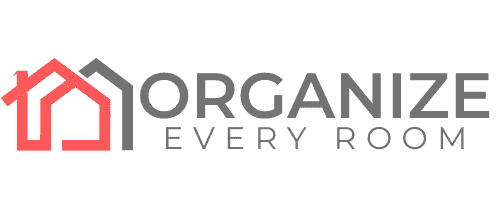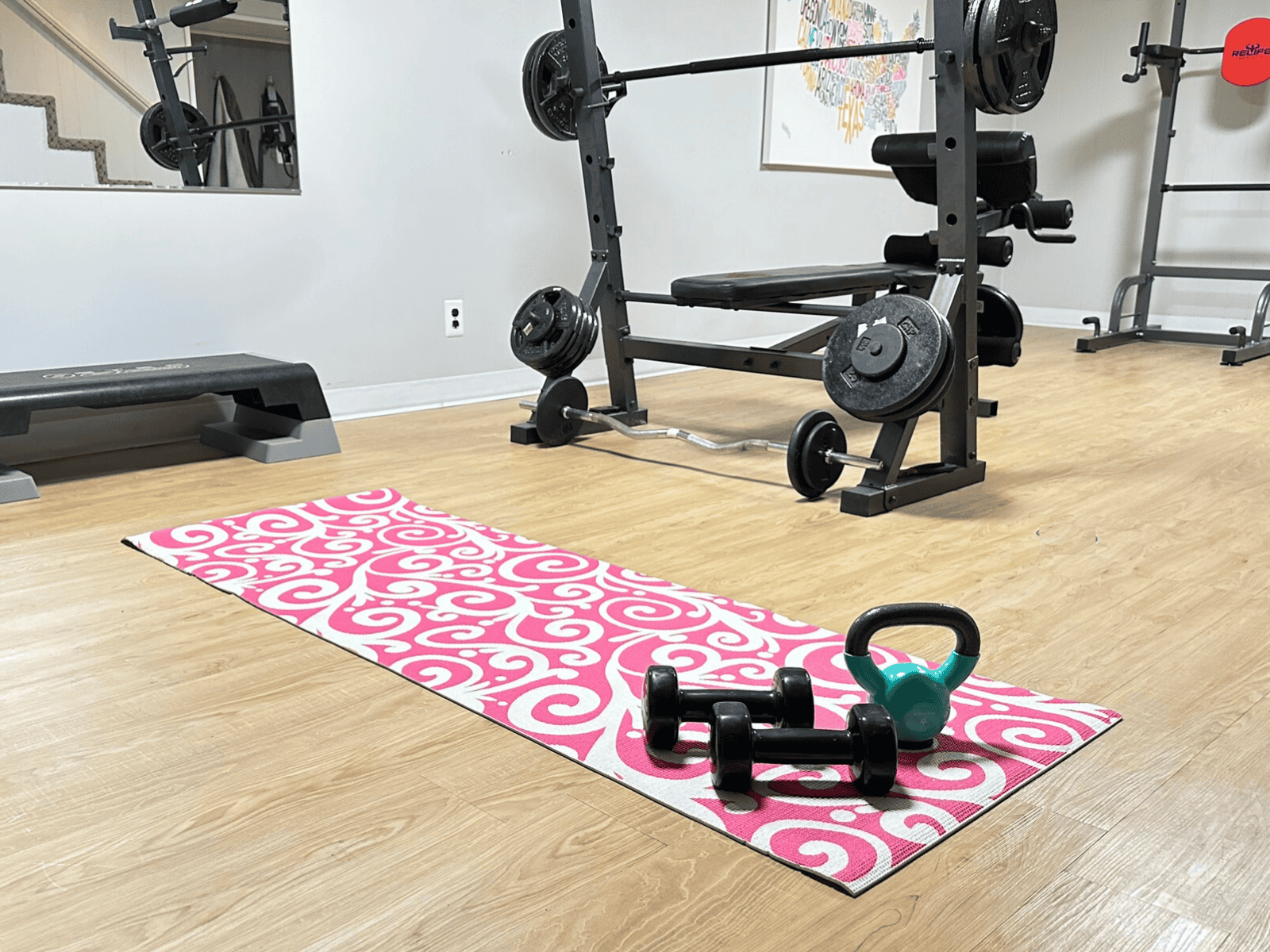Organized Home Gym Ideas
As a busy person with a demanding schedule, I struggled to consistently make it to the gym. That’s when I decided to create my own organized home gym, saving time, money, and my sanity. By involving my entire family in our fitness journey, we’ve made exercise a priority without the hassle of expensive memberships or inconvenient hours.
However, simply having a home gym wasn’t enough. As a home organizing expert, I knew I needed to implement smart, organized home gym ideas to ensure my space was functional, inviting, and motivating.
In this article, I’ll share the tips and tricks I learned while setting up my home gym. I hope this will help you create a workout area that supports your fitness goals, whether you have a dedicated room or a cozy corner.
Let’s get started on creating the organized home gym of your dreams!
My Home Gym Space
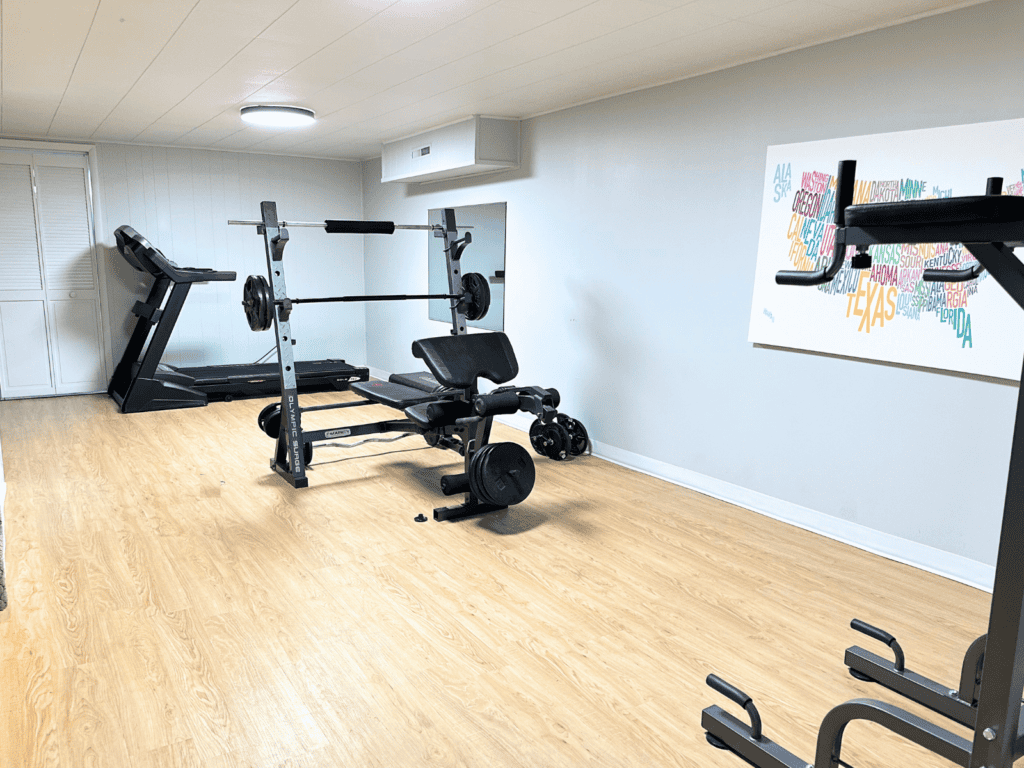
Dimensions and Layout
Our 24 x 13-foot basement has been transformed into a functional home gym. We’ve utilized every square foot, including the nook under the stairs, which houses our weight rack, dumbbells, resistance bands, stability ball, and yoga mats, all of which fit perfectly beside our gun safe.
The treadmill is positioned against one wall, while the adjustable stepper sits below a large mirror, allowing for easy transitions between cardio and strength training. The weight bench is situated between the pull-up bar and the stepper, providing convenient access to the barbell set.
On the opposite wall, a heavy-duty pull-up bar offers an excellent upper-body workout. Our thoughtful equipment selection and placement have created an organized, efficient layout that maximizes space and enhances our workout experience.
Laminate Peel-and-Stick Flooring
For our home gym flooring, we chose TrafficMaster Luxury Vinyl Plank flooring, a laminate peel-and-stick solution that is durable, affordable, and easy to install. As a landlord, I’ve used this flooring in our rental properties and can attest to its quality.
The peel-and-stick application is straightforward and doesn’t require any special tools or adhesives. TrafficMaster offers the look and durability of high-end flooring at a budget-friendly price, making it an excellent choice for a home gym.
This flooring is resistant to scratches, dents, and stains, which is essential in a gym setting with heavy weights and equipment. Installation was a breeze; we cleaned the floor, peeled off the backing of each plank, and stuck them down in a staggered pattern. The entire project took just a weekend, resulting in a professional-looking gym floor.
Next, we’ll explore the essential gym equipment we chose for a versatile and effective workout space.
This post contains affiliate links. For more information, see my disclosures here.
My Essential Gym Equipment
Treadmill
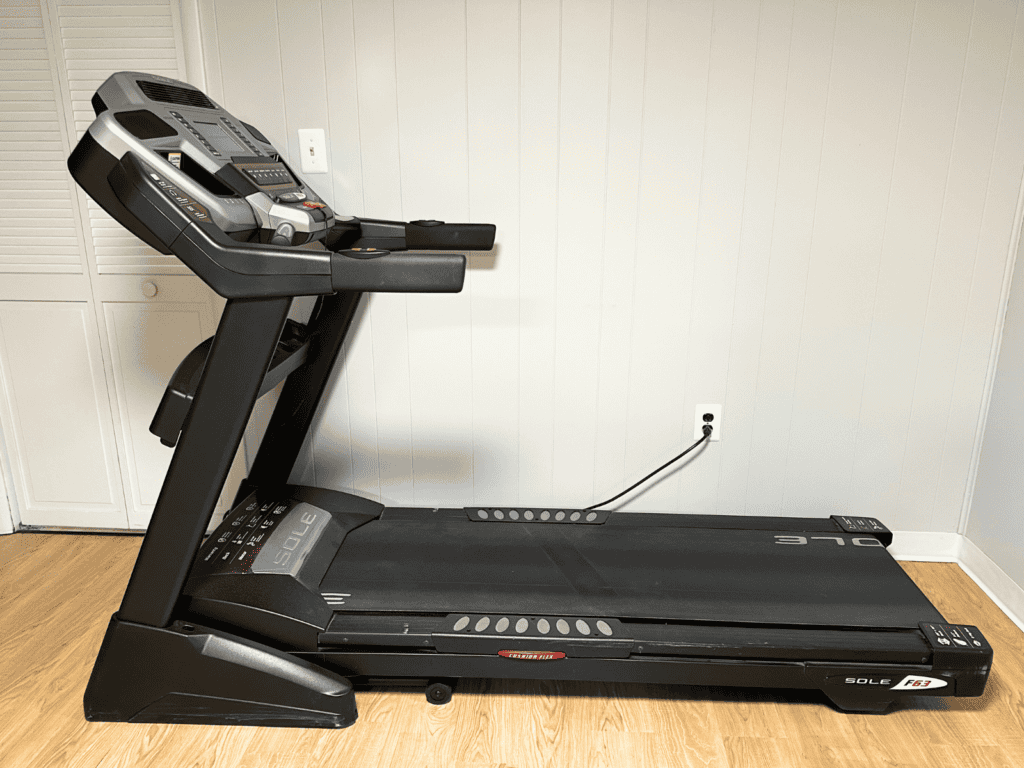
The Sole F63 treadmill is a key piece of equipment in my home gym. Its folding capability allows me to save space and maintain a clutter-free environment when the treadmill is not in use. I can easily fold it up and store it out of the way, maximizing my gym area and keeping it organized.
Weight Rack and Accessories
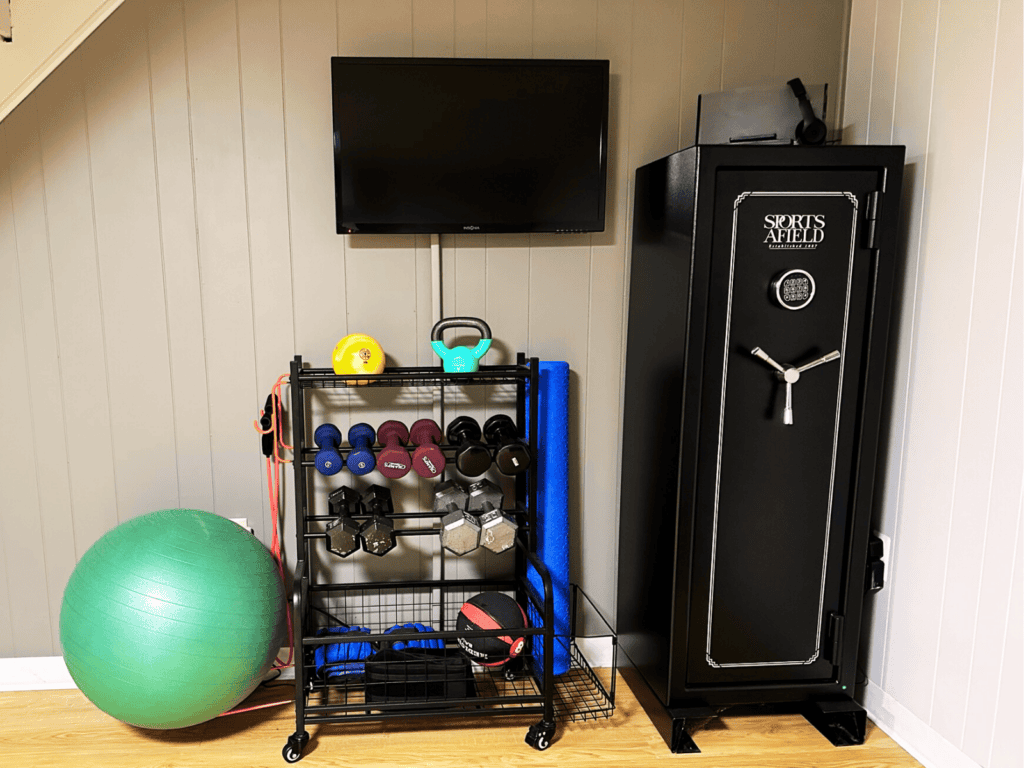
The Mosxoed All-in-One Large Home Gym Storage Rack is the centerpiece of my strength training setup. This sturdy and multi-functional rack keeps all my equipment organized and easily accessible. It stores various accessories, such as:
The rack’s space-saving design and built-in storage options are essential for maintaining a clutter-free and efficient home gym.
Adjustable Step and Weight Bench
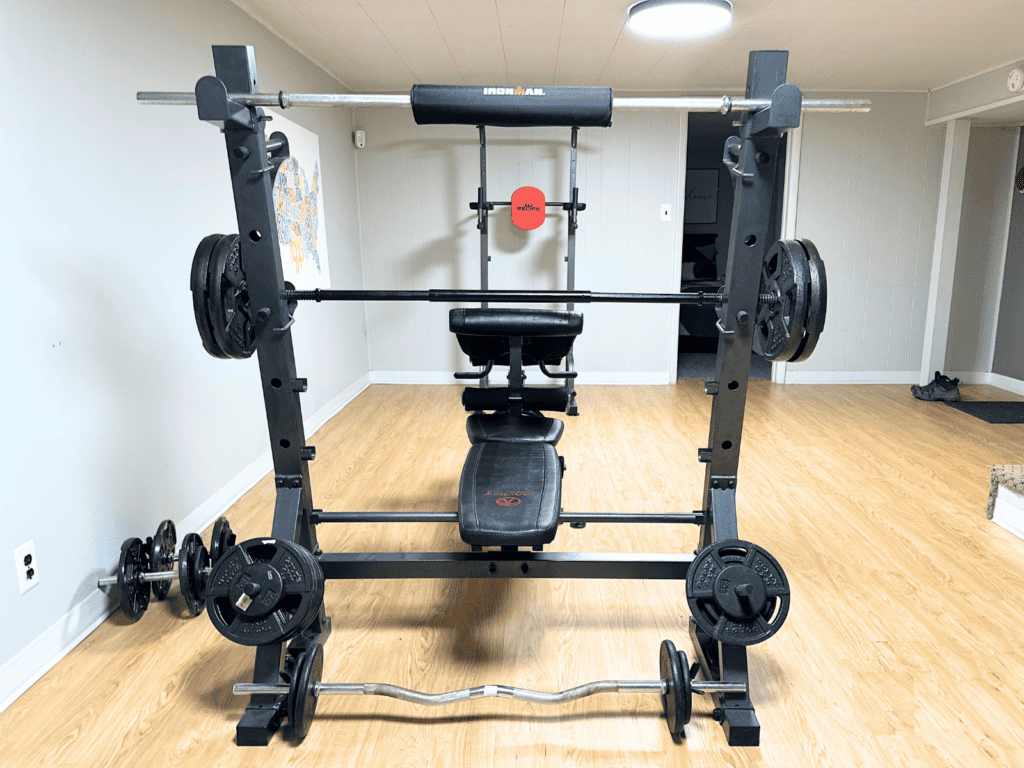
I’ve incorporated a Reebok workout step and a weight bench into my home gym to maximize space and versatility. The adjustable step is stored neatly when not in use, and the weight bench is conveniently located near my curl bar and barbell set, allowing for easy transitions between exercises.
The weight bench features a removable preacher curl pad and leg developer, which I can attach when needed and store separately when not in use, saving space and keeping my gym organized.
Pull-up Bar
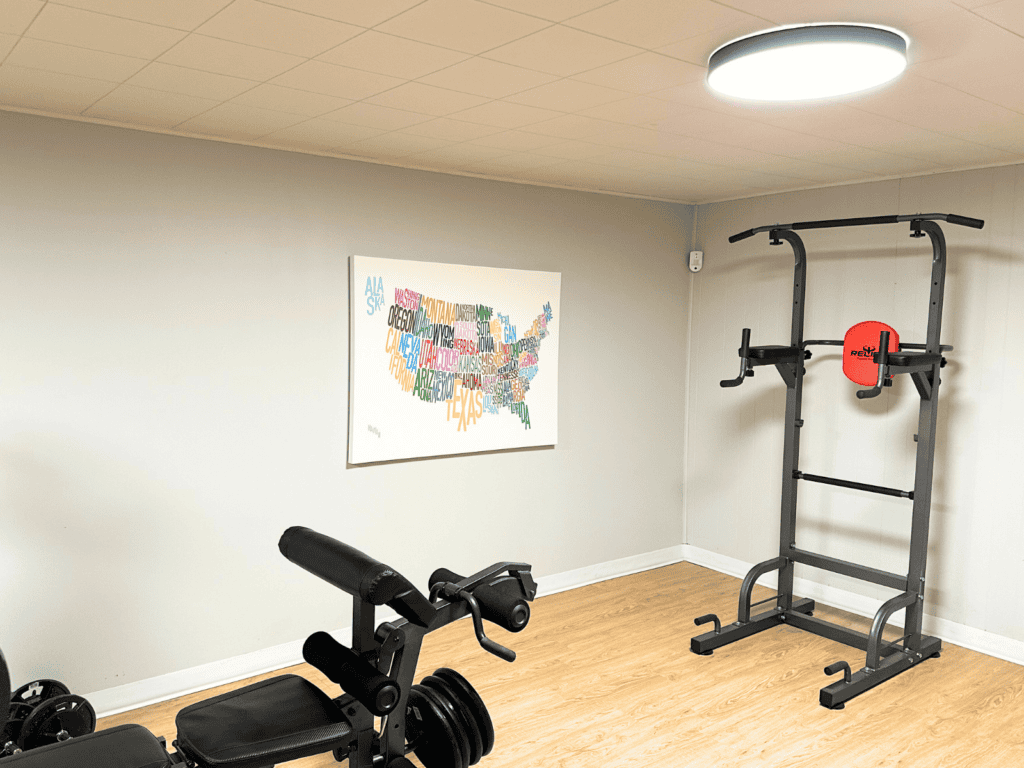
The RELIFE Power Tower is a freestanding pull-up bar that fits perfectly in my home gym. Its compact design doesn’t take up much space, and it offers a variety of exercise options without the need for additional equipment. The tower’s sturdy construction ensures stability during workouts, and its sleek design complements my gym’s organized appearance.
Gym Atmosphere Enhancements
Wall Mirrors
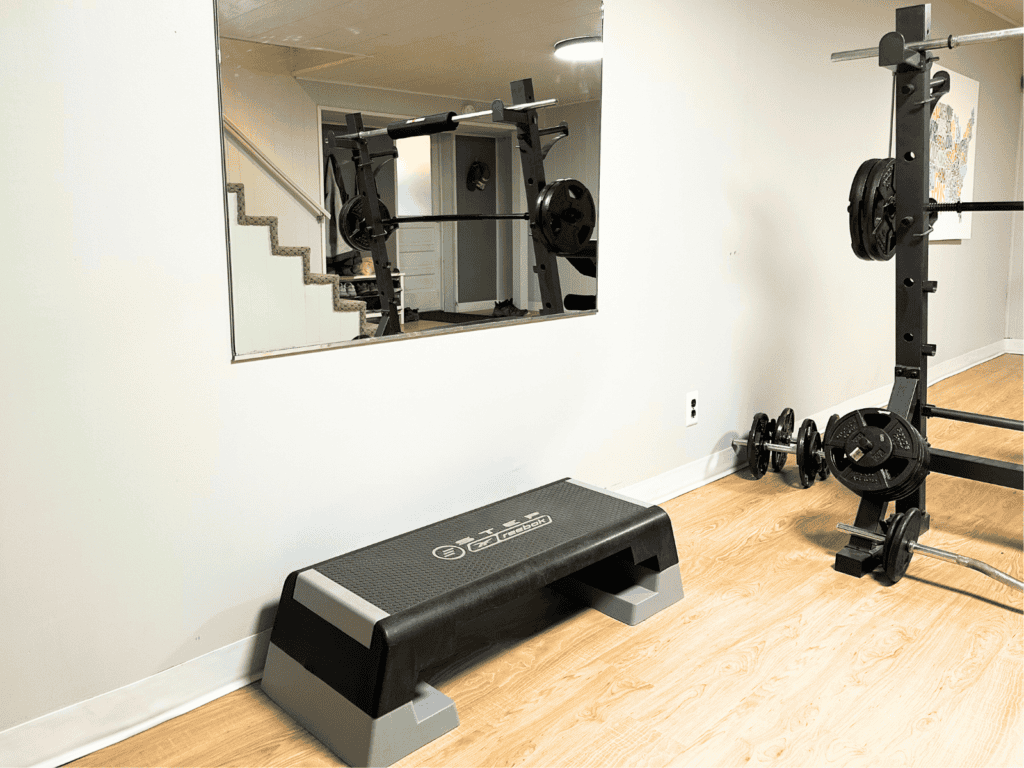
I purchased a 3-foot by 4-foot mirror from Lowe’s and installed it on the wall opposite my weight rack. This positioning gives me ample space to lift dumbbells in front of the mirror and helps make the space feel larger and more open.
Television And Audio System
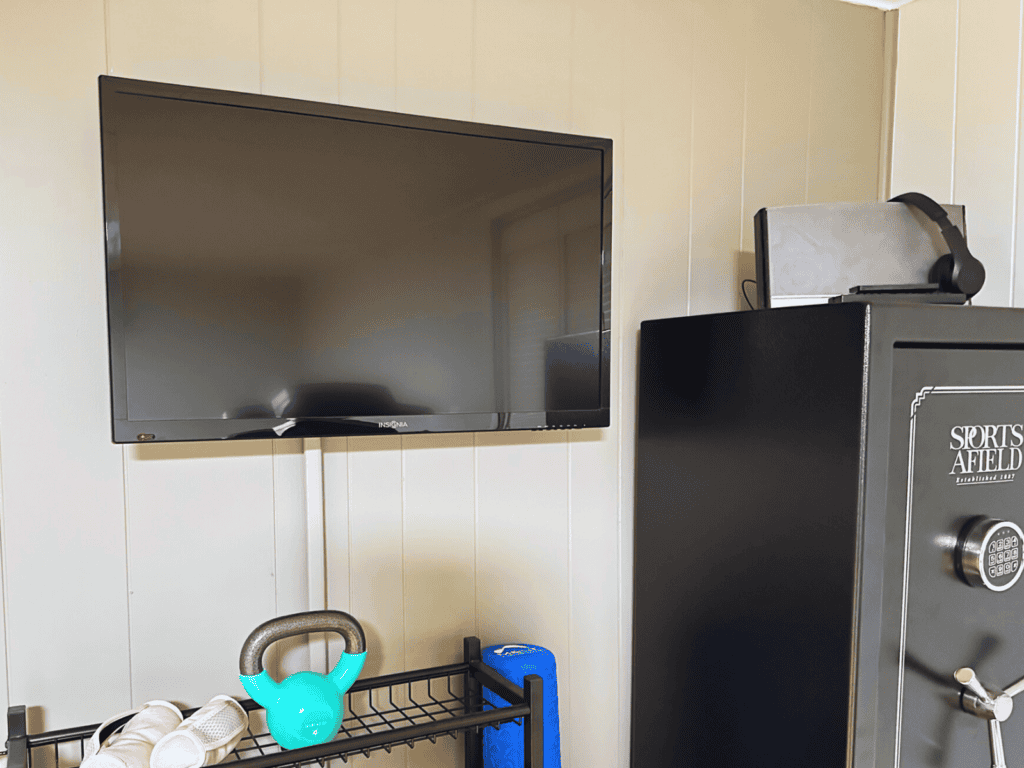
I’ve installed an Insignia TV on the wall above the weight rack to make workouts more enjoyable and provide a source of entertainment or instructional videos. To maintain a clean and organized look, I used cord hiders to conceal all the wiring, keeping the gym space neat and professional-looking.
I keep our small, portable Bose speaker on top of the gun safe. It’s the perfect spot because there’s an outlet right there, and it’s also where we keep the accessories to connect our phones to the speaker. I also store a pair of headphones there since I prefer to use them, while my husband likes to use the speaker.
Motivational Decor

I’ve hung a picture of the United States on one of the walls. This serves as a constant reminder of all the beautiful places we can go hiking if we stay in shape. It’s a great motivational tool that encourages us to stick to our fitness goals and dream about future adventures.
My Home Gym Organization Strategies
Designated Storage Spots
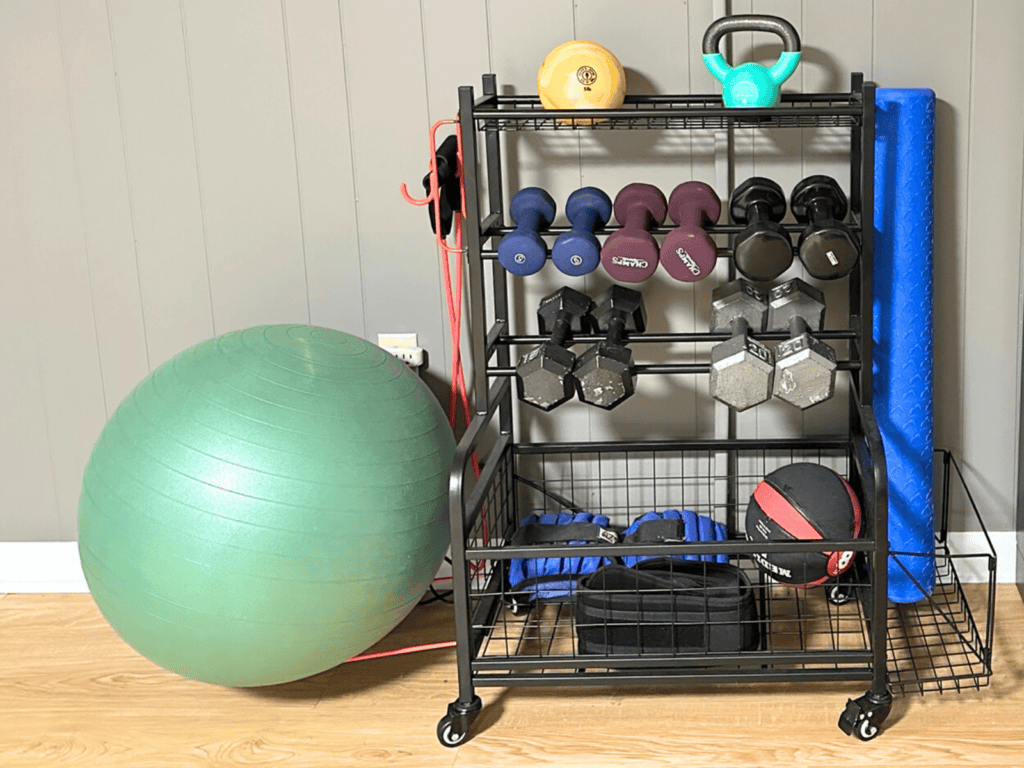
Every piece of equipment in my home gym has a designated spot, ensuring a clutter-free and efficient workout space. Dumbbells and kettlebells are neatly organized on the weight rack, with weight plates for the barbells stored on the pegs built into the weight bench rack.
Medicine balls and ankle weights are stored in the bottom basket of the weight rack, while yoga mats, resistance bands, and a stability ball are conveniently stored on the sides. The adjustable step is tucked neatly against the wall beneath the mirror when not in use.
Cost Considerations: Home Gym vs. Commercial Gym Membership
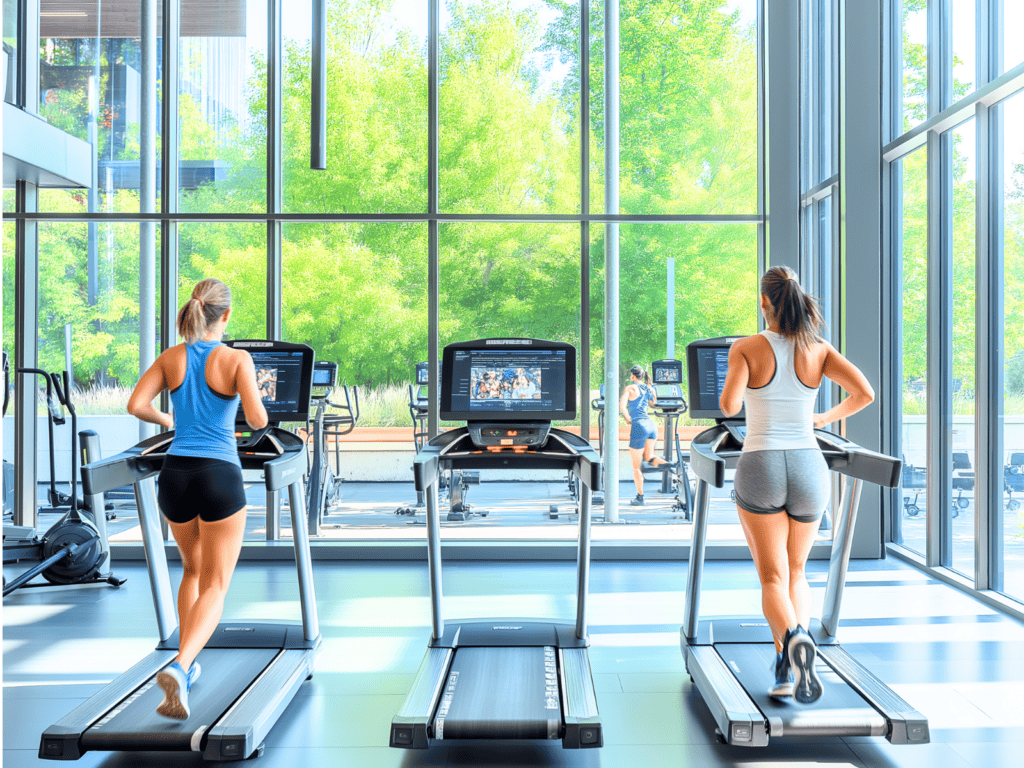
At the beginning of this post, I mentioned that one of my motivations for creating a home gym was to save money. So, did I actually save money with a home gym? Let’s break down the costs and compare them to a commercial gym membership to find out.
Cost is often a significant factor in deciding whether to create a home gym or join a commercial gym. Here’s a detailed look at the expenses involved in my home gym setup and how they compare to the potential cost of a family gym membership over time.
Initial Home Gym Setup Costs
- Flooring (TrafficMaster Luxury Vinyl Plank): $716
- Sole F63 Treadmill: $2900
- Mosxoed All-in-One Large Home Gym Storage Rack: $85
- Dumbbells: $94
- Curl Bar With Weights: $200
- Barbell: $70
- Reebok Adjustable Step: $130
- Weight Bench: $300
- RELIFE Power Tower (Pull-up Bar): $143
- Mirrors: $70
- Bose Portable Speaker: $375
- Television: $130
- Picture of United States: $80
- Miscellaneous (yoga mats, resistance bands, etc.): $183
Total Initial Investment: $5476
Commercial Gym Membership Costs
Average monthly family membership at a local gym: $100/month Annual cost: $1200
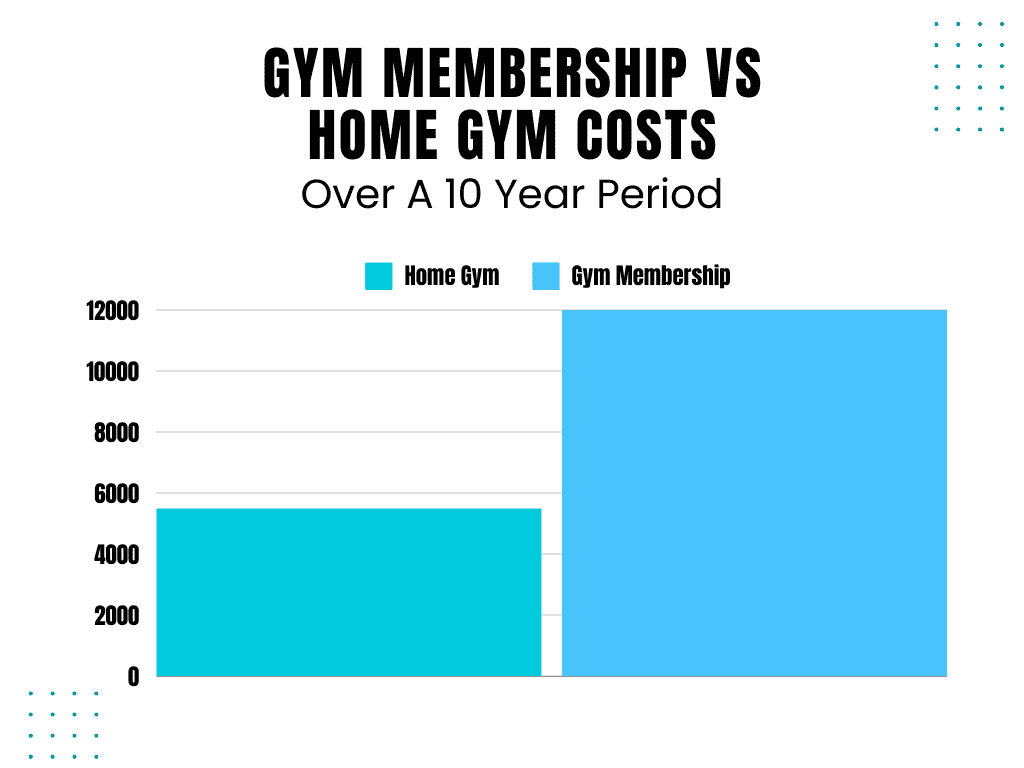
Cost Analysis: When Did My Home Gym Pay for Itself?
To understand the financial benefit of my home gym, let’s compare the time it took for the initial investment to pay off to the time it took for a commercial gym membership.
Initial Home Gym Investment: $5476. Monthly Family Gym Membership Cost: $100
Break-Even Calculation: $5476 ÷ $100 per month = 55 months
It took approximately 55 months, or 4 years and 7 months, for my home gym to “pay for itself” compared to what I would have spent on a family gym membership.
After this break-even point, we’ve essentially been “working out for free” compared to paying for a gym membership. Plus, we haven’t incurred any additional costs for maintenance or repairs, making the long-term savings even more significant.
Additional Considerations
While the upfront cost of a home gym can be significant, it often becomes more economical than a gym membership over time, especially for families. The convenience and customization options add value beyond mere dollars and cents. For us, the investment in a home gym has paid dividends in both financial savings and improved fitness habits.
Customizing Your Home Gym for Different Spaces
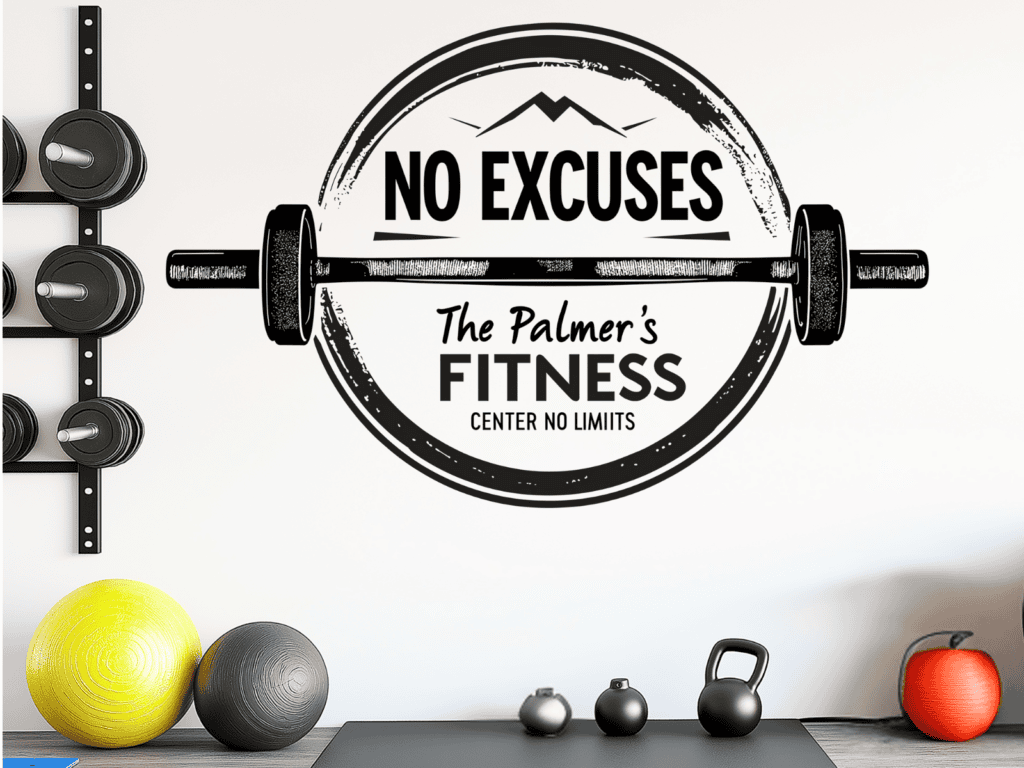
While I’ve shared my experience setting up a gym in a 24 x 13-foot basement, I understand that not everyone has the same space available. The beauty of a home gym is that it can be adapted to fit various living situations. Here are some ideas for creating an effective workout space, no matter the size or layout of your home:
Studio Apartment or Small Living Room (50-100 sq ft)
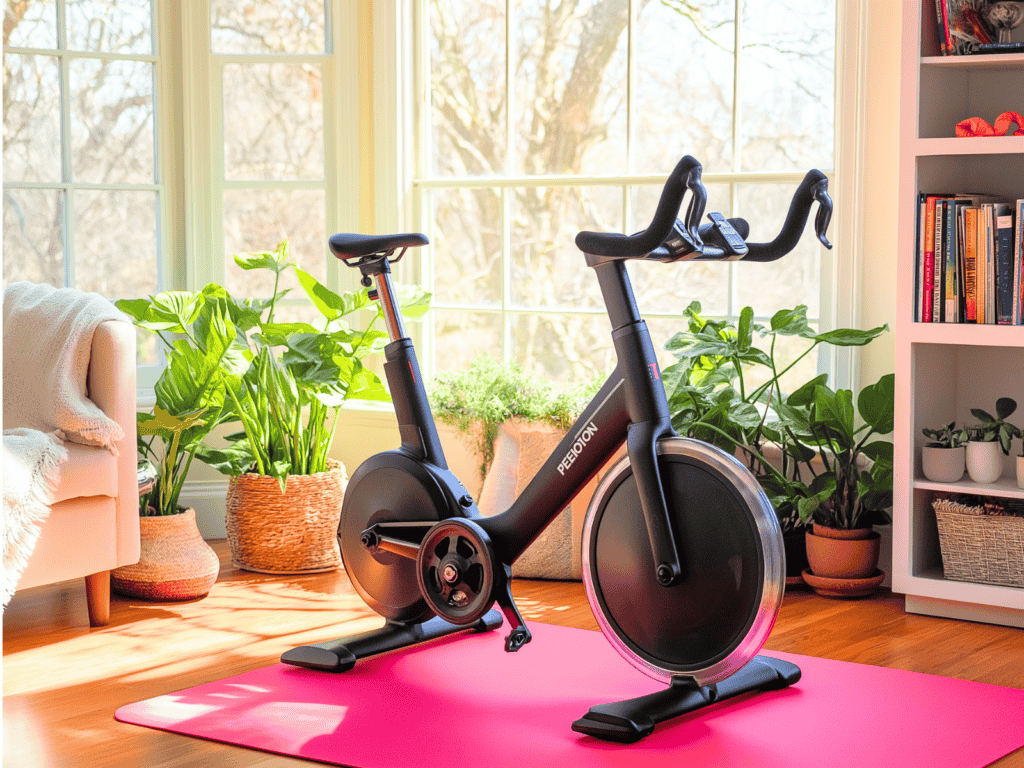
In a compact space, focus on versatile, space-saving equipment:
- Use a folding treadmill or a compact elliptical that can be stored under a bed or in a closet.
- Invest in adjustable dumbbells that replace multiple sets of weights.
- Consider a wall-mounted pull-up bar that can double as an anchor point for resistance bands.
- Use a corner of the room for a yoga mat, which can be rolled up when not in use.
- Utilize vertical space with wall-mounted storage for small equipment like resistance bands and yoga blocks.
Spare Bedroom (100-200 sq ft)
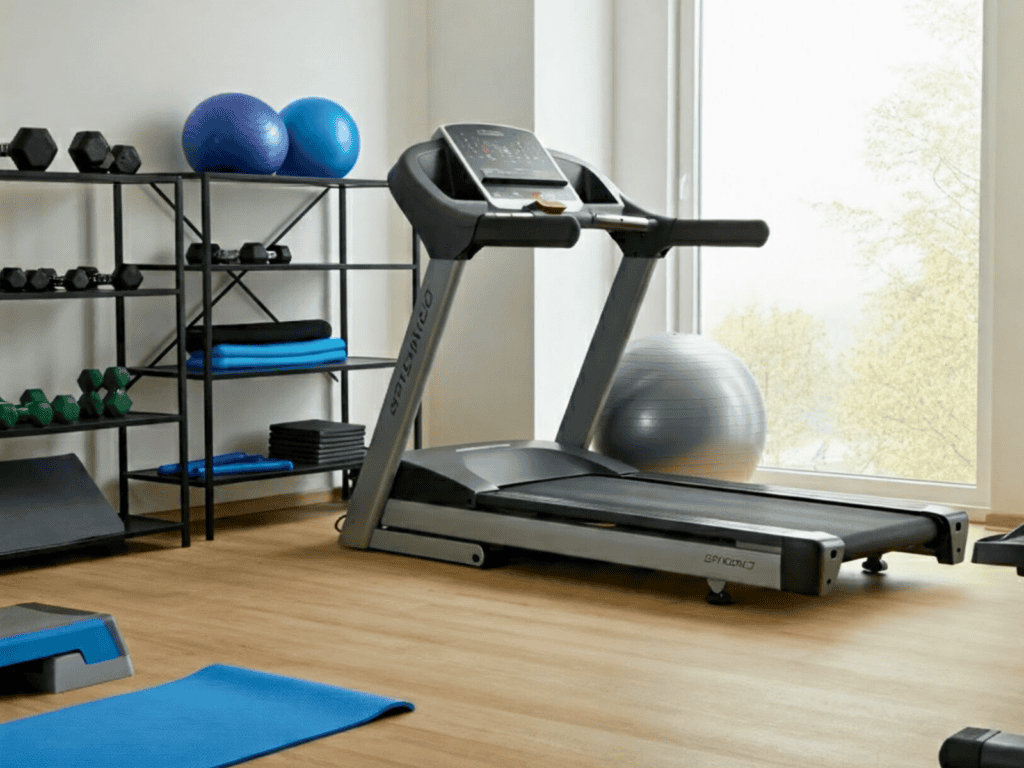
With a bit more space, you can include:
- A multi-functional weight bench that can be used for various exercises.
- A squat rack with a pull-up bar positioned against a wall.
- A small cardio machine like a spin bike or rowing machine.
- Wall-mounted mirrors to check form during workouts.
- Under-bed storage containers for smaller equipment.
Garage Gym (200-400 sq ft)
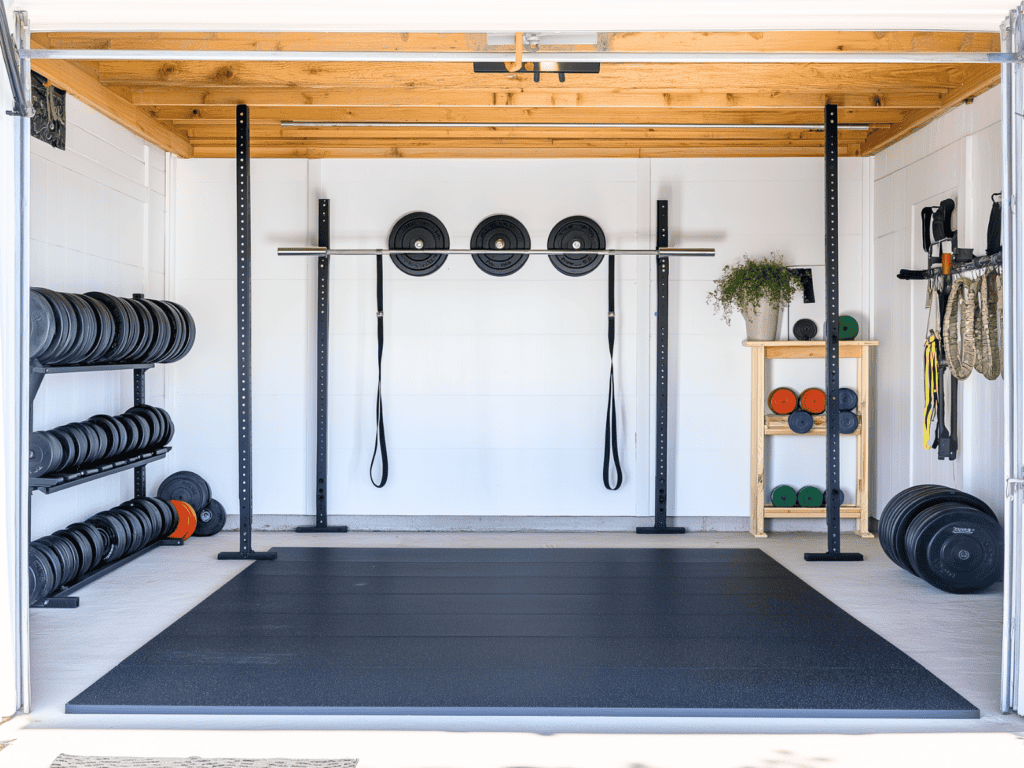
A garage offers more flexibility:
- Install rubber flooring tiles for a durable, safe workout surface.
- Use a wall-mounted folding squat rack to save space when not in use.
- Include a variety of free weights and a sturdy weight bench.
- Add larger cardio equipment like a treadmill or elliptical.
- Install ceiling-mounted storage racks to free up floor space.
- Consider a wall-mounted fan or portable AC unit for temperature control.
Outdoor Space
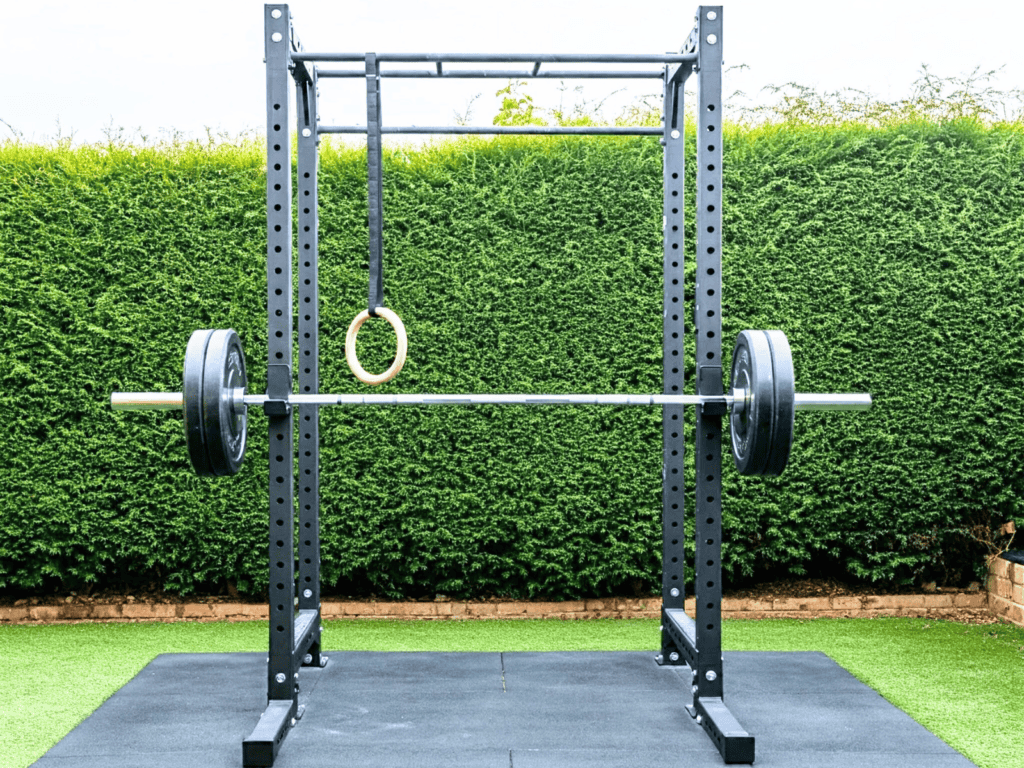
If you have a patio, deck, or yard:
- Invest in weather-resistant equipment like outdoor pull-up bars or parallel bars.
- Create a covered area for cardio equipment to protect it from the elements.
- Use heavy-duty storage containers to keep smaller equipment dry and secure.
- Consider artificial turf for a soft, all-weather surface for bodyweight exercises.
Multi-Purpose Spaces
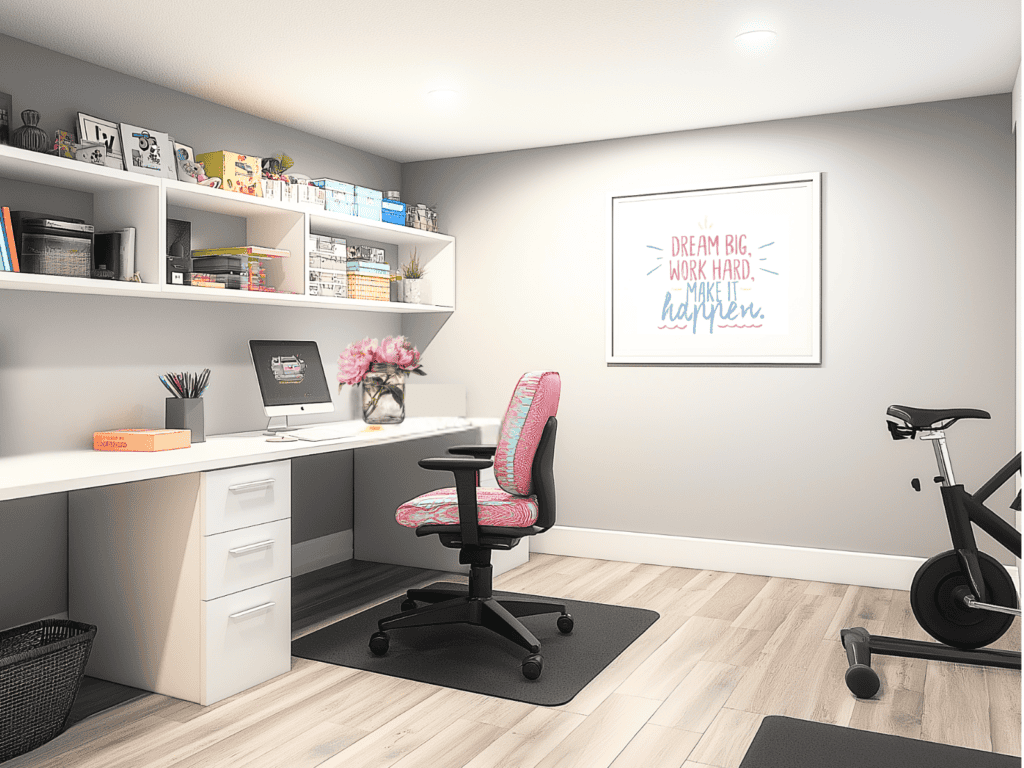
For areas that need to serve multiple functions:
- Use room dividers or curtains to create a dedicated workout zone.
- Opt for equipment on wheels for easy rearrangement.
- Invest in attractive, multi-functional furniture like a storage bench that can be used for step-ups.
- Choose equipment in colors and styles that complement your existing decor.
Remember, thoughtful planning and organization are the keys to a successful home gym in any space. Prioritize the equipment that aligns with your fitness goals and make the most of vertical space and multi-functional items. With creativity and smart choices, you can create an effective workout area in virtually any living situation.
Conclusion
Creating my organized home gym has been a rewarding experience. It’s a space that supports my fitness goals and reflects my passion for organization. I’ve transformed a once-underutilized basement into a functional and inviting workout haven by carefully planning the layout, selecting the right equipment, and implementing creative storage solutions.
Remember, an organized home gym is more than just a collection of equipment; it’s a space that inspires and motivates you to prioritize your health and well-being. With a little planning and creativity, you can create your own organized oasis where you’ll look forward to breaking a sweat and achieving your fitness dreams.
